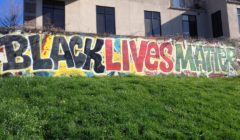5 Reasons Caribbean People Might Not Fully Identify With the #blacklivesmatter Movement


 Those removed from everyday American life might be led to believe that everything is everything in the land of the free, what with a black President, Attorney General, Jesus (Yeezus) – yeah we don’t find Kanye amusing either. However, if you take the temperature of race relations over the past year you’ll find that it has damn near reached a Jim Crow fever in terms of its reach into the black-American psyche. But what of the Afro-Caribbean Psyche? Can we feel America’s oppression just as the American’s do? Aside from our gratuitous reposts of news stories and memes that often falsify our empathy, do we really understand the black struggle in the USA? Are Caribbean migrants afraid for their lives? Here are reasons they might not be, even if it is subconscious naievity:
Those removed from everyday American life might be led to believe that everything is everything in the land of the free, what with a black President, Attorney General, Jesus (Yeezus) – yeah we don’t find Kanye amusing either. However, if you take the temperature of race relations over the past year you’ll find that it has damn near reached a Jim Crow fever in terms of its reach into the black-American psyche. But what of the Afro-Caribbean Psyche? Can we feel America’s oppression just as the American’s do? Aside from our gratuitous reposts of news stories and memes that often falsify our empathy, do we really understand the black struggle in the USA? Are Caribbean migrants afraid for their lives? Here are reasons they might not be, even if it is subconscious naievity:
- Violence in the Caribbean is typically black-on-black
Most police forces in the Caribbean region are predominantly black. While police brutality is prevalent in those institutions, the murders of people in custody are rarely based on race. There is a far more uncertain player afoot in many of the Caribbean’s instances of police involved killings. Even though racial profiling may not always be the factor that leads to the killing of a black person in police custody or during police action, the question with always loom because of the United states’s sordid history of oppression. The Cariibbean has almost let is history of slavery slide beneath the guise of social development and nation building. But, what have we sacrificed in that process?
- We mind our own business
It might be a Caribbean cliche, but for a lot of Caribbean minds, if it is not happening to us or in our own backyards, ain none-a my business. This is not to say we cannot be an empathetic people – Caribbean people come from some of the kindest cultures on earth – but we often feel our sizes as very small nations and unjustly question our impact. We tend to our homes and immediate families before we venture out and tend to others. Our solidarity to our Caribbean family is strong, because something connects each culture. However, we don’t always connect with those outside. And, so, our culture demands that we mind our business. Social media has made is easier to reach out from afar, but is the sentiment and empty gesture or genuine?
- We don’t understand black-American culture
There is a long-standing debate over why Afro-Caribbean students perform so much better in American school than black Americans. Part of that reasoning is that Afro-Caribbean do not understand the culture. We are taught at a young age that everyone is equal (notwithstanding the often inherent xenophobia that trails rampant illegal migration). Even white, asian and indian children who grow up in predominantly black schools in the Caribbean, identify more with blacks than they do with their own race. This is less likely to be the case in America. We visit and emigrate to the USA with a chip on our shoulders and take a cursory caution to the tales of white-on-black brutality. Our minds are not hardwired to think like black americans who have almost passed their fear of oppression down in their genes. While todays America is nothing like the America of our parents, it is still an America that fears, denigrates and represses African Americans. BUT WE ARE NOT AFRICAN AMERICANS!
- We are not African Americans and therefore not part of the struggle
This may be the biggest trap for Caribbean folk who visit American by the hundreds of thousands each year – some never to return home. When you step of that plane/boat/sloop, you are African American, and no amount of patois, creole or Bahamianese will identify you as anything other than black. This point becomes moot the moment it is uttered. It may not be fear, but the only identifier of those who must be oppressed in the USA is skin colour. Still, Caribbean people pretend as if they are a different kind of black and brush off the real danger of being black in America.
- We still tolerate white privilege and favour whiteness
It’s why the joke about the cake soap is funny. It’s why reggae music speaks of bleaching so heavily. It’s why foreign investors – who are typically white – are welcomed with the red carpet, while citizens struggle to get a piece of the economic pie in their own countries. We love white. It is a moldy crumb from our colonial past that we swallow time and time again. And even though that generation is slowly dying out, some of our millennials have still consumed the kool-aid. Our comrades in the US have fought for equality for hundreds of years, while we developed tourism and banking to pander to our favorite masters. We have given ourselves just enough power to feel free, while slipping ourselves into a new kind of servitude.


You must be logged in to post a comment.